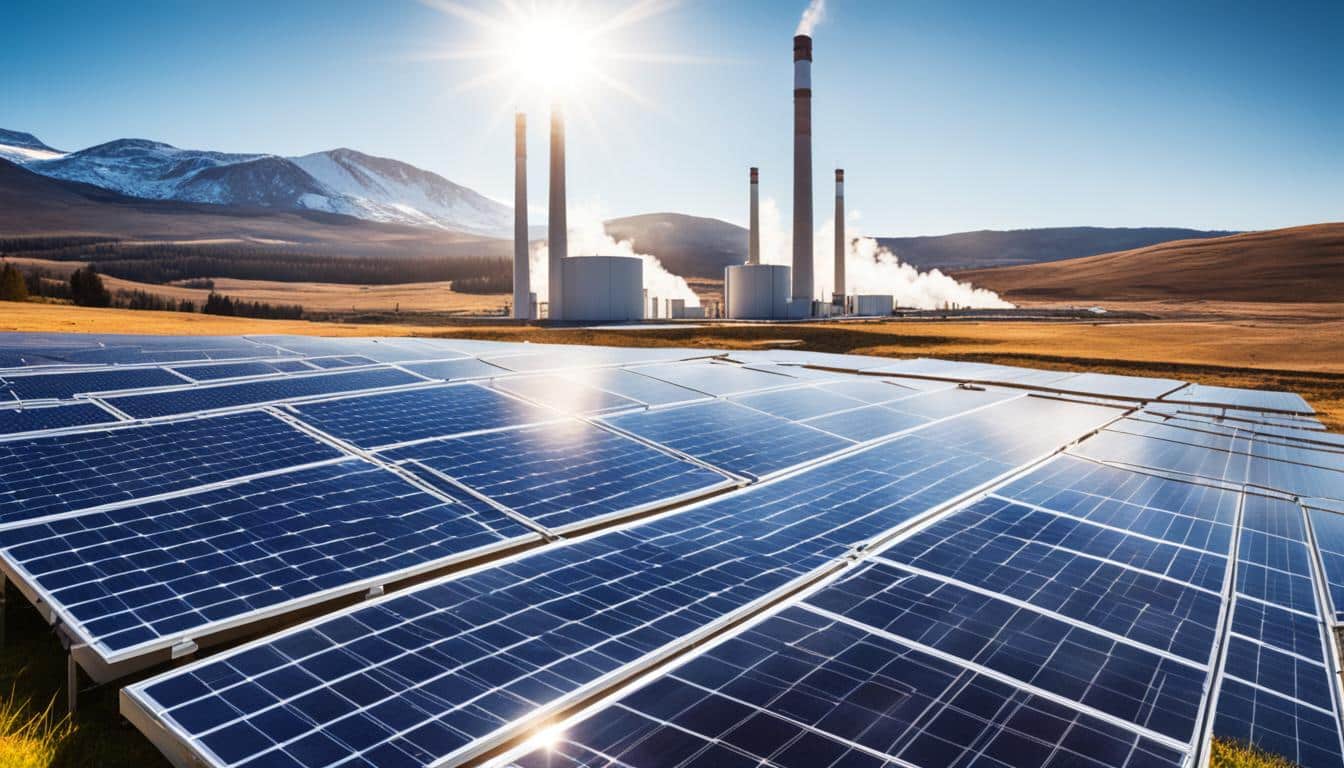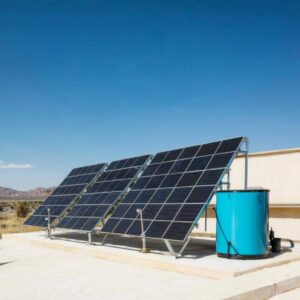
In today’s rapidly evolving energy landscape, the search for sustainable and affordable power sources has become more critical than ever. With concerns over rising electricity prices and the need for industrial growth, it’s essential to explore renewable energy options that can meet these demands.
In this article, I will analyze two prominent contenders in the renewable energy arena: solar energy and geothermal power. We will delve into their potential, benefits, and feasibility for providing a stable and cost-effective electricity supply to support industrial growth. So, let’s dive in and discover the ultimate showdown between solar energy and geothermal power.
Key Takeaways:
- Solar energy and geothermal power are both renewable energy sources with the potential to provide sustainable, affordable electricity.
- Electricity prices in the UK have seen a significant increase, hindering industrial growth and calling for alternative energy solutions.
- Geothermal power, utilizing subterranean wells and steam extraction, offers the possibility of cheap and renewable energy.
- Nuclear fission is an additional option to consider for medium-term power supply.
- Prioritizing geothermal power and nuclear fission simultaneously can form a comprehensive energy strategy for the UK.
The Potential of Geothermal Energy for the UK
Geothermal energy has tremendous potential as a sustainable and renewable power source for the UK. With the rising concerns about energy scarcity and the need for affordable electricity, geothermal energy emerges as a promising solution. The power potential of geothermal energy is vast, offering the possibility of near-limitless energy if made accessible globally.
Natural geothermal energy can be harnessed relatively cheaply in locations with a steep geothermal gradient, such as Iceland. The variance in the geothermal gradient directly impacts the maximum temperature of a well and the amount of electricity that can be produced. By tapping into this natural resource, countries like Iceland have successfully achieved a 100% renewable and carbon-neutral electricity grid.
Exploration of innovative drilling technologies opens up even more possibilities for geothermal energy extraction. Quaise Energy, an American geothermal start-up, proposes using gyrotrons to vaporize rock and reach deeper depths for geothermal energy extraction. This cutting-edge drilling technology has the potential to significantly enhance the efficiency and cost-effectiveness of geothermal energy production.

Untapped Investment Potential
Despite its promise, geothermal energy has received less investment compared to wind and solar energy. This underinvestment hinders the widespread adoption of geothermal power and limits its contribution to the energy mix. However, geothermal power holds considerable theoretical potential. The earth’s crust holds more power than all the world’s uranium, thorium, and fossil fuel reserves combined.
Government Support and Collaboration
In order to unlock the full potential of geothermal energy, research and development in this field should be prioritized and funded by the government. Efforts should be made to repurpose technology from fusion research for drilling in geothermal projects, leveraging existing expertise and resources. Collaboration with international experts in geothermal projects can also accelerate progress and drive innovation.
“Geothermal energy has the potential to revolutionize our energy landscape. By harnessing this vast source of renewable power, we can significantly reduce our reliance on fossil fuels and combat energy scarcity.”
A Path to Affordable and Sustainable Energy
Commercial generation from geothermal energy should be managed by a new public utility targeting energy-intensive industries. By prioritizing geothermal energy over speculative attempts to commercialize nuclear fusion, substantial progress can be made in achieving affordable and clean electricity for industrial users. Increased investment in geothermal energy could lead to a significant reduction in industrial electricity prices, fostering economic growth and sustainability.
Conclusion
To achieve sustainable and affordable electricity, the UK government needs to prioritize geothermal power and nuclear fission. Research and development for geothermal energy should receive more funding and support. Collaboration with international experts in geothermal projects can accelerate progress.
Geothermal energy, along with small modular reactors (SMRs) for nuclear fission, can provide cheap and zero-carbon electricity for industrial users. The SMR competition should be split up to prioritize advanced entrants like Rolls-Royce. Achieving cheap and clean electricity is a prerequisite for significant industrial growth in the UK.
By prioritizing renewable energy sources like geothermal power and nuclear fission, the UK can create a sustainable energy future and support industrial growth.
FAQ
What are the benefits of solar energy?
Solar energy is a renewable energy source that utilizes the sun’s rays to generate electricity. It is clean, sustainable, and does not produce greenhouse gas emissions. Solar power systems can help reduce electricity bills and provide energy independence.
What are the advantages of geothermal power?
Geothermal energy is a renewable resource that harnesses the natural heat stored within the Earth’s crust. It provides a consistent and reliable source of power, reducing dependence on fluctuating energy prices. Geothermal power plants have a small footprint and emit low levels of greenhouse gases.
How do electricity prices affect industrial growth?
High electricity prices can hinder industrial growth by increasing production costs and decreasing competitiveness in the global market. Limited access to affordable and firm electricity supply can lead to industrial stagnation and a decline in output.
Why should the UK prioritize geothermal energy?
Geothermal energy has the potential to provide cheap and renewable power, reducing industrial electricity prices. It can contribute to a sustainable energy future, support industrial growth, and lessen reliance on fossil fuels. Prioritizing geothermal energy aligns with the UK’s goal of reducing greenhouse gas emissions and achieving carbon neutrality.
How does geothermal power compare to other renewable energy sources?
Geothermal power offers a reliable and consistent energy supply, unlike wind and solar energy that depend on weather conditions. It has considerable theoretical potential, with the Earth’s crust holding more power than all the world’s uranium, thorium, and fossil fuel reserves combined.
What is the potential payoff of investing in geothermal energy?
Geothermal energy requires little initial cost and has enormous potential payoff. Increased investment in geothermal research and development can lead to significant reductions in industrial electricity prices, promoting economic growth, and creating job opportunities.
How can drilling technology improve geothermal energy extraction?
Advanced drilling technologies, such as using gyrotrons to vaporize rock, allow for deeper depths and increased geothermal energy extraction. These innovations can enhance the efficiency and productivity of geothermal power plants, making them even more viable and cost-effective.
Should nuclear fission be considered alongside geothermal power?
Nuclear fission, while controversial, is a proven and reliable source of power. By considering both geothermal power and nuclear fission, the UK can diversify its energy portfolio and ensure a stable and consistent electricity supply. These sources complement each other and contribute to a sustainable energy strategy.
How can geothermal energy research and development be funded?
Government support and funding are crucial for advancing geothermal energy research and development. Prioritizing geothermal projects, repurposing technology from fusion research, and collaborating with international experts can accelerate progress and maximize the potential of geothermal power.
What role can geothermal energy play in achieving sustainable and affordable electricity?
Geothermal power, along with small modular reactors (SMRs) for nuclear fission, can provide cheap and zero-carbon electricity for industrial users. By prioritizing renewable energy sources like geothermal power and nuclear fission, the UK can create a sustainable energy future, support industrial growth, and reduce greenhouse gas emissions.






